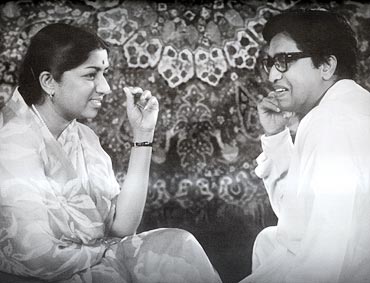

Kashee KaaL NaagiNee
Year: 1957
Composer: Hridaynath Mangeshkar
Poet: B.R. (Bha Ra) Tambe
Doing a write up on Lata Mangeshkar is an almost absurd thought, a concept which is most difficult to visualize, let alone conceive. It may be a bit easier to write about individual singers and music directors in the Bollywood industry, but to write about this nightingale is like the thought of doing extreme sports- full of hazards.
To state a simile – I could possibly write about the individual characters from Mahabharata, like Yudhishtir, Arjun or even the great warrior Karna, but to attempt to write about the character of Lord Krishna is a task which no mere mortal can even dream of accomplishing. Lord Krishna is the soul of Mahabharata or rather, to put it more accurately, Lord Krishna is Mahabharata. Similarly, Lata Mangeshkar is the soul of Indian Music or to be more precise, Lata Mangeshkar is Indian music personified.
As the say in Marathi:
Kharaa lekhak each – Vyas,
Baaki sarvaannchaa Havyaas !
(There is only one genuine author in this world and that is Ved Vyas, who penned Mahabharata; All the other aspiring authors display their avidity, their greed/avariciousness).
To write about Lata Mangeshkar, who is Maa Saraswati reborn, is not feasible in this human form, to understand her singing and write about it simultaneously is beyond the limitations of the human mind!
To understand her music is a process akin to the state of meditation – the perfect communion with the present, by shedding away the intrusions of the past and avoiding gazing at the looming shadows of the future. In short, it is impossible to for the conscious mind to delve into the depths of Lata Mangeshkar’s singing without attaining the state of meditation. But then, there is a catch - when you are in a state of meditation, you cease to remain yourself, “You” has no separate existence, the logical and analytical ability of the being becomes silent. Then how does one contemplate writing about one’s experiences in this state of meditation?
What can I say about her singing, when the various Indian languages themselves have been vying with each other to be reborn out of the persona of this Saraswati Maa in the form of melodious verses, being bathed in the ethereal voice and in the euphonious and heavenly swara of this Gaan Apsara!
But as they say, “there is a charm about the forbidden that makes it unspeakably desirable”.Or, as Oscar Wilde said “I can resist anything except temptation”!
Hence, I, being a simple man who does give in to his temptations, as frequently as Oscar Wilde or Mark Twain did – if not more – I have decided to share with you, some of the jewels of Lataji’s scintillating musical career, which are like trailblazers in the world of Indian music, illuminating the path for other mortals to follow. Here is the first one.
Apparently, unconfirmed sources mention that the first Marathi song composed by Hridaynath for his Lata Didi was “ Kashee KaaL naagiNee”.
This is a phenomenal poetry with a very covert meaning and one of the best from the famous poet Bha Ra Tambe. To select such a difficult poem for a debut composition speaks volumes about the caliber and the talent of Balasaheb (as Hridaynath is fondly called). And Lata has done more than 100% justice to this song. This song is influenced by a combination of ragas, mainly loud hints of Malgunji and then traces of Gorakh Kalyan in the beginning of the stanza. The surprise element, which was to become a signature of Balasaheb’s songs, is the employment of the komal Rishabh in the sign line!
The high point of this song, the Tirtha Kshetra or the sanctum sanctorum for music worshippers is the 2nd line in the 3rd stanza. The lines are “Paapeen khilaley teera, virah haa, shastraavin vadhi” – its loose translation would mean that
“I, the sinner, am stuck on this side of the shore (of the river);
This tribulation of separation is like being slain without a weapon.”
The subtle pause in this stanza, which has been devised before the word ‘Shastra’ is absolutely mind-blowing. While listening to this line, one tends to wait with baited breath for that word to be sung so as to avoid missing the sam (the dominant beat in the taal) and even that nanosecond wait seems like an eternity, as if experiencing the agony of being almost being slain (without a weapon) when suddenly the heart starts to beat after a period of asystole! I can bet that no singer from the current lot can attempt to sing this line in one take!
Author info is not available!